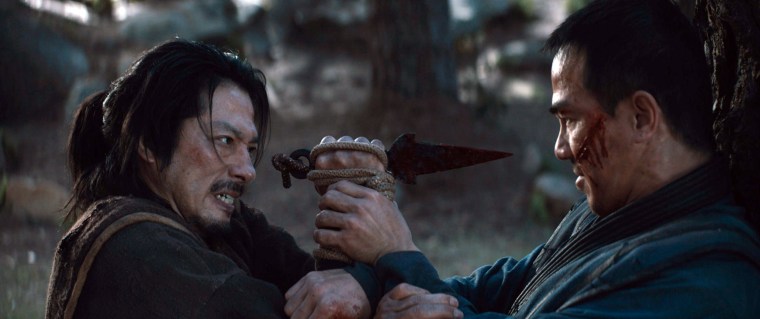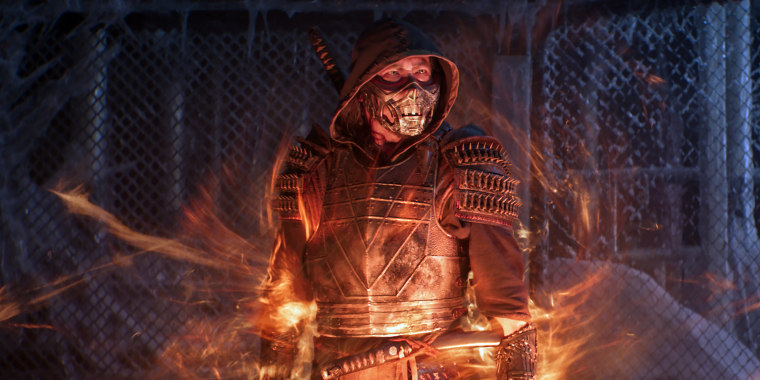There is a lot to love in both the first 15 minutes and the last 15 minutes of “Mortal Kombat,” Simon McQuoid’s debut feature about the men, women and unnameable horrors from the underworld doing battle. What they're doing battle for is … well, I’m not entirely sure, but it’s something, and certainly something important — probably the fate of the universe.
Enough about saving the universe: Look! There’s Hiroyuki Sanada, protégé of the legendary martial artist Sonny Chiba, playing a Japanese peasant sparring with international judo master Joe Taslim. Truly, you might foolishly think, things are off to a good start.
But then there’s the rest of the film.
There are no good movies based on video games, but there are “good” video game movies, like Paul W.S. Anderson’s “Resident Evil” flicks and his original “Mortal Kombat” movie, a goofy 1995 action flick based on Midway’s series of fighting games in which you and a friend each pick a character and try to beat each other up in bloody, absurd ways.
The persistent problem with trying to sell tickets based on nostalgia is that fidelity to the property tends to fill up the space where a good director might usually show some creativity.
The original game, which came out in 1992, looks positively quaint now with its pixelated blood and its absurd “fatalities” when you win — that's where the victor yoinks the beating heart out of or pulls the head from, spine intact, the loser's body. They were, however, graphic enough then to inspire a whole series of grandstanding Senate hearings in 1993 about the harm supposedly done to kids by virtual violence; these hearings, of course, helped popularize the game. To my knowledge, no fifth grader ever ripped the spine out of another kid at soccer practice in imitation of Sub-Zero.
Still, the games’ ridiculous finishing moves — the fatalities and brutalities (gory humiliations), babe-alities (in which you defeat your enemy by turning him into a baby) and animalities (in which your character turns into an animal that eats your opponent, which wasn't implemented until the third iteration of the game), among others — were the topic of much elementary school discourse. I clearly remember boys on the playground telling each other that their cousin’s best friend had mastered the arcane disciplines necessary to execute secret nudealities, in which a series of complex button sequences would make the sexy female characters undress. (These codes did not work — or, it turns out, exist.)

I wish the new movie was as fun as any, let alone all, of that.
The aforementioned Sanada, whose incredible fight sequence at the beginning will give you hope for the film, plays a farmer whose family is attacked by a ninja in their home; the bloody action is highly choreographed — though not on a par with, say, the "John Wick" movies. And as soon as we — that is, the Gen Xers and millennials of the intended audience — see the peaceful farmer start hurling a dagger around on the end of a rope, we know exactly who we’re looking at: Scorpion (Sanada) fighting with ice wizard Sub-Zero (Taslim).
Great fight scenes come down to making sure audiences understand where the characters are in relation to one another at all times.
But then the movie completely shifts gears, and we discover all this has been prelude: The protagonist of the film is actually Cole Young (Lewis Tan), a loser of an MMA fighter, who is about to be recruited by Jax (Mehcad Brooks) and Sonya Blade (Jessica McNamee) because of his birthmark, which looks like the video game’s dragon logo.
For an hour and change after that, "Mortal Kombat" pretends to be a lesser Marvel Comics movie — something to which a depressingly large number of contemporary big-budget films aspire.
The thing none of the Marvel Cinematic Universe knock-offs have is the Marvel team’s mania for surpassing its previous installment. Rag on them all you want — I have — but the best of the MCU movies are honestly pretty good and even in the worst of them (like “Thor: The Dark World”), the climactic action sequence is at least fun and clever. Whether or not they’re cynical exercises in marketing-as-cinema, the Marvel films know you’re not going to come back for the next one if you don’t remember having at least a moderately good time.
But in "Mortal Kombat," the big action sequences revisit territory already covered in better films. The jokes are dumb and unfunny and the characters are barely there — which is all sort of to be expected in a video game movie, though it would be nice to see one that tries a bit harder. Much worse, however, is that the actual fighting just isn’t shot very well, except for those opening and closing sequences.
People liked playing the Mortal Kombat game because they’d never seen anything like it, even though the graphics weren't even as good as the special effects in theaters in 1992.
A lot of that can be laid at the feet of what feel like compulsory CGI, or computer-generated image, special effects; it’s hard to make a four-armed cartoon monster do complex martial arts with an actual martial artist in a visually compelling way. But there are also just a lot of bad angles on great fighters doing cool stuff, and the fights are almost universally confusing for viewers to watch. Great fight scenes come down to making sure audiences understand where the characters are in relation to one another at all times, and in this the filmmakers just fell short far too often.
Perhaps this mostly comes down to the persistent problem with trying to sell tickets based on nostalgia in the first place: Fidelity to “intellectual property” tends to fill up the space where a good director might usually show some creativity. That seems to have been entirely the case here. The special effects are mostly devoted to giving us photorealistic renditions of the grainy fireballs and ice balls and laser eye-beams that someone else thought was what made the original games fun.
But what should have been obvious from the continuing popularity of those games from 1992 is that image quality doesn’t please audiences; invention does. People liked playing the (first few) Mortal Kombat games because they’d never seen anything like them, even though the graphics themselves weren't even as good as the special effects in theaters in 1992. But in the 2021 movie "Mortal Kombat,", they can see something exactly like most of the fight scenes, all of the special effects and every one of the big action sequences — and often done better — elsewhere, if they haven't already. The film offers almost no interesting flourishes or innovations on the themes the original game helped establish.
The callouts are all there for people who will go to see anything with “Mortal Kombat” in the title — Kano (Josh Lawson) says “Kano wins;” other characters declare, “Fatality!” and, “Flawless victory!” — but it all feels sort of insulting, like the filmmakers know they already got away with charging us the price of our tickets and aren’t particularly interested in us anymore.
The best thing I can say about “Mortal Kombat” is that it made me want to watch a violent action movie I genuinely enjoyed — so, afterward, I watched Takashi Miike’s 2017 live-action adaptation of the manga series “Blade of the Immortal.” It was fantastic.


